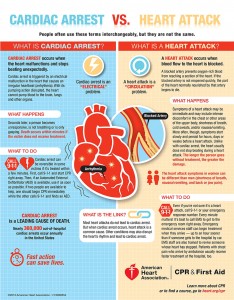A heart attack is not the same thing as cardiac arrest. It’s important to know the difference between the two and what steps to take should you suspect either.
A heart attack occurs when blow flow to the heart is blocked, preventing oxygen-rich blood from reaching the section of the heart affected. If the artery that is experiencing the blockage is not reopened to allow blood flow to continue, the part of the heart that is connected to that artery can die. Heart attack symptoms* include:
- Chest discomfort. Most heart attacks involve discomfort in the center of the chest that lasts more than a few minutes, or that goes away and comes back. It can feel like uncomfortable pressure, squeezing, fullness or pain.
- Discomfort in other areas of the upper body. Symptoms can include pain or discomfort in one or both arms, the back, neck, jaw or stomach.
- Shortness of breath with or without chest discomfort.
- Other signs may include breaking out in a cold sweat, nausea or lightheadedness.
Unlike a heart attack, in which symptoms can start slowly and develop over a few days or weeks, cardiac arrest occurs suddenly and without warning symptoms. It is signaled by a malfunction in the heart which causes an irregular heartbeat, preventing the heart from pumping blood to vital organs, including the brain and lungs. If not treated immediately, a person can die within minutes.
Cardiac arrest can occur after a heart attack, and heart attacks increase the risk of cardiac arrest.
What to do if you suspect a heart attack is occurring? First, call 911, and if you can get the patient to the hospital sooner than waiting on emergency response, do so.
If you suspect cardiac arrest, first dial 911, and if an AED is present, use it. CPR should also be performed immediately while waiting on emergency response, as cardiac arrest can be reversible if treated within the first few minutes.
For more information on heart attacks and cardiac arrest, check out this informative infographic from The American Heart Association:
It’s never too late to learn CPR. Contact us online or at 866-990-2772 to book a class in Raleigh/Durham or Richmond today!
Source: heart.org*


